78 Search Results for object symbols
April 3, 2014
by Carole Zangari -
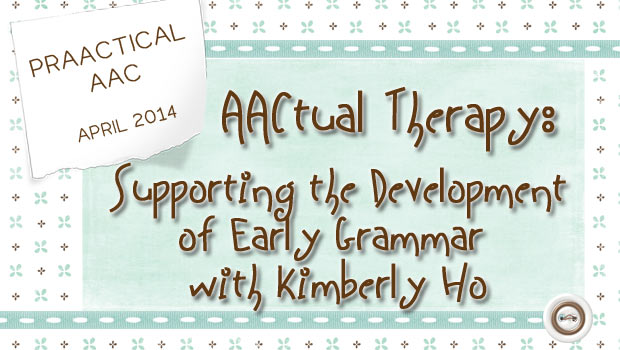
Our guest post for today is from SLP Kimberly Ho, an AAC specialist who operates a private practice, AAC Services. I met Dr. Ho many years ago when she was getting her master’s degree at Purdue University. She went on to get her doctorate and now consults for a number of public schools and works with individuals with AAC needs from preschoolers to adults. Kimberly is active in teaching (undergraduate and graduate courses), writing (published three articles in peer reviewed journals) and public speaking (15 presentations at regional, national and international conferences). In this post, she discusses some concepts in teaching grammar to people who are learning AAC. Traditionally, individuals with complex communication needs (CCN) were provided with communication boards or speech generating devices (SGDs) filled with topic specific vocabulary often called fringe words. The field of AAC is only just beginning to provide early communicators with access to Core... [Read More...]
January 13, 2014
by Robin Parker -
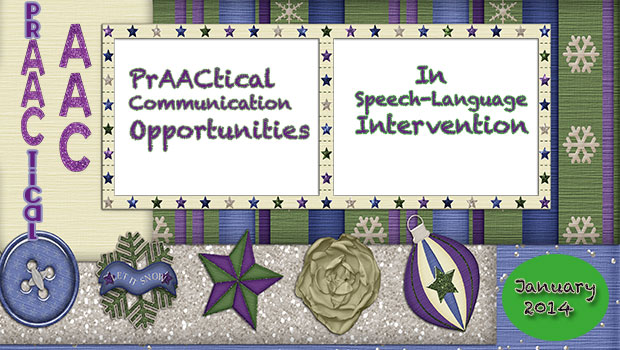
Planning for communication opportunities in every aspect of speech-language therapy helps ensure productive use of time and effort for both clinician and learner. It is not enough to talk to a student, it is not enough to provide fun activities without lots of opportunity for active participation and more specifically communication initiation. Another word for communication initiation/opportunities is communication temptations. Communication temptations are structured situations designed to entice a variety of specific communication functions or semantic relations (Wetherby, 1988). There needs to be lots of times where there is targeted modeling and then a specific, obvious reason for the learner to be the initiator of communication. A temptation to communicate. Take a look at this sample therapy session for frequent and multiple communication opportunities. Please let us know a favorite or creative communication opportunity that you use. PrAACtical Considerations Meaningful AAC Goals– All quality speech-language intervention sessions start with meaningful... [Read More...]
November 30, 2013
by Robin Parker -
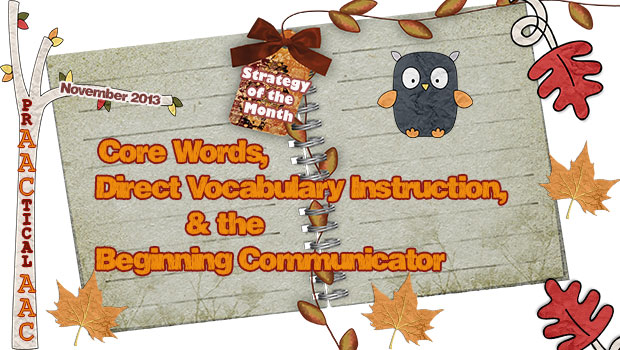
Direct vocabulary instruction is important for all level learners. The beginning communicator needs to learn core word vocabulary from USING the words and one of the best ways to learn how to USE core words, is to receive specific direct instruction with many opportunities for active participation. 6 Essential Philosophies & Strategies Vocabulary instruction involves a systematic TEACHING process. Add vocabulary or Words as an activity on the daily schedule and then have a mini-schedule for the specific vocabulary instruction activities for that day. Initially, apply an errorless learning paradigm. Then, gradually, add comprehension checks, but do not wait for ‘proof’ of comprehension before adding new words because we often notice that the beginning communicator will demonstrate comprehension during ‘unexpected opportunities- or when you are least expecting it. Once learners become familiar with some of the specific vocabulary activities, then have some choice making opportunities as to which ‘word activities’... [Read More...]
October 14, 2013
by Carole Zangari -
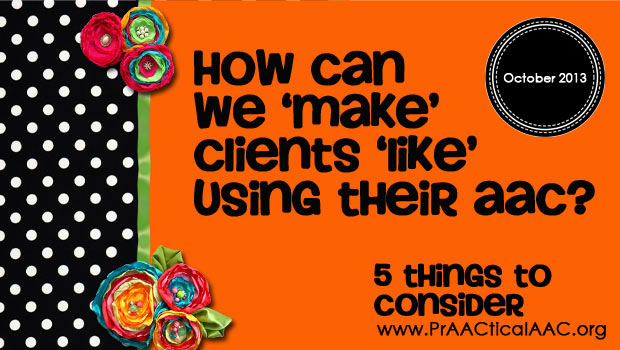
That’s a question we hear from time to time, and it often stops us in our tracks. The good thing about this question is that is signals that the clinician recognizes a stumbling block and is searching for a way around it. Like many things in our lives as SLPs, it’s all about problem-solving. So, how DO you make learners like their AAC? Well, for starters, we don’t like ‘making’ people do anything. Offer, entice, tempt? Yes, frequently. ‘Make’? Not our first, second, or third choice. If we have a really strong rationale and we’ve run out of other options, we may go there. When it comes to helping our clients learn to like their AAC systems, here are some things we think about. 1. We like what we’re good at: Until someone is proficient at aspects of their AAC system, it will feel like work. Why? Because it is... [Read More...]
September 3, 2013
by Carole Zangari -
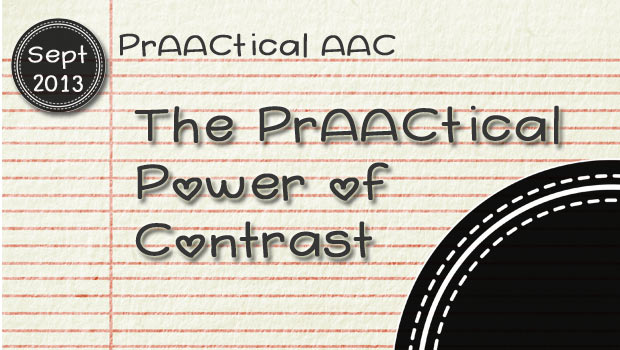
It’s a(nother) new semester for us and that means we get the chance to work with a whole new crop of graduate student SLPs who are learning to provide AAC services for the very first time. It just doesn’t get any better than that! One of the challenges for all beginning clinicians is deciding what intervention strategies to use to facilitate their clients’ learning in various areas. Recently, I had a wonderful conversation about the power of contrastive examples. I was taught this strategy by Dr. Ed Kame’enui and still use his ‘glerm’ activity today to illustrate the concept. The ‘glerm’ activity was quick way to demonstrate how to use carefully chosen examples to teach a new concept. Here’s the activity. You have to use your imagination and pretend this is a demonstration rather than a paper-and-pencil activity, but you’ll get the idea. And glerm is….? If I did a good... [Read More...]
June 8, 2013
by Robin Parker -
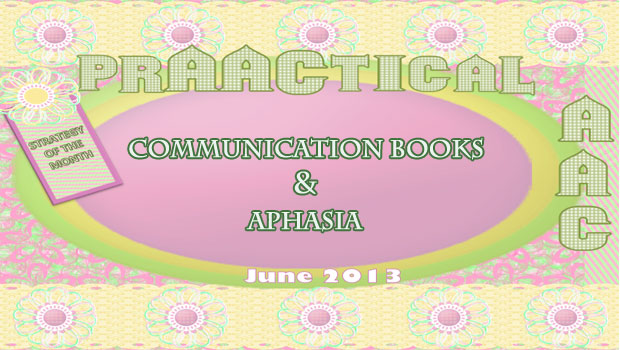
We know aphasia intervention has moved well beyond traditional speech and language training and intervention. We are so happy it has moved to an authentic participation, functional communication, and social interaction focus. Communication books are one tool for helping people with aphasia be active participants in conversation and comprehensive communication. Here are some thoughts and ideas about communication books to get started. Communication Books- Communication books for adults with aphasia can be in grid format with relevant communication messages. There can be a few pages or many, but keep in mind that the more pages, the longer it will take to navigate. It is most important to include high priority and relevant messages that will support needed communication and not just ‘standard’ messages. There are many samples and templates that can be purchased or downloaded for adult communication books. These may be good as a start, but should be individualized when... [Read More...]
June 1, 2013
by Carole Zangari -
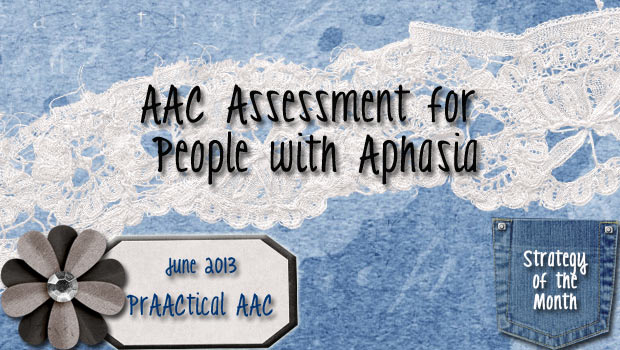
Many people with aphasia fail to regain sufficient speech and language skills to meet their communication needs. With more than one million people with aphasia in the US alone, chances are most people reading this know at least one person affected by the disorder. While many go on to regain functional speech and language skills, some remain unable to communicate well enough catch up with a neighbor, talk about bills with a spouse, ask a question in a store, play with a grandchild, or tell their healthcare providers about side effects or symptoms. It’s hard to really imagine how devastating and isolating this experience may be. Aphasia Awareness Month seemed like the perfect time to reach out to SLPs with information on AAC for people with aphasia. In this post, we’ll share some thoughts and resources on assessment. Assessment activities are, of course, driven by the purpose for which the... [Read More...]
May 23, 2013
by Carole Zangari -
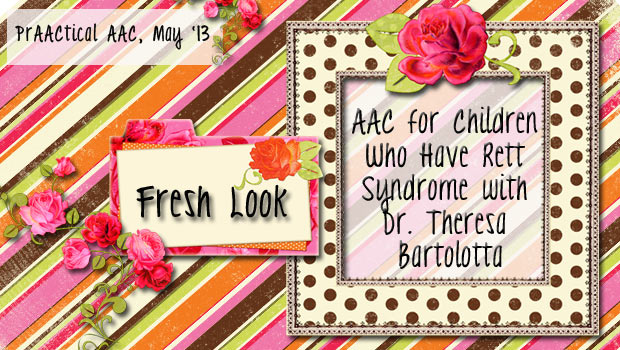
In our SLP training programs, few of us learned about Rett Syndrome or how to provide services to children with that disorder. We’re so pleased to have a guest post on AAC services for children with Rett by Dr. Theresa Bartolotta, Director of Assessment in the Office of the Provost, and Associate Professor in the Department of Speech-Language Pathology, at Seton Hall University, in South Orange, New Jersey. An SLP with over 30 years of clinical experience, she specializes in communication disorders in children with significant disabilities with a special interest in autism and Rett syndrome. Our field is still learning about Rett syndrome and we are still discovering new things about the range of skills and abilities present in the children who have it. In this post, Dr. Bartolotta gives us some background about the syndrome and discusses implications for treatment. I am thrilled to have this opportunity to post... [Read More...]
April 25, 2013
by Carole Zangari -
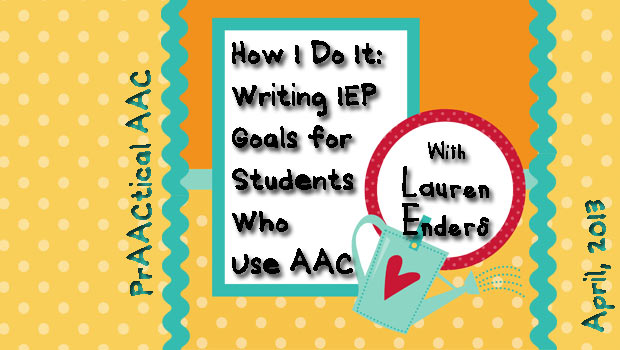
We’re so happy to welcome Lauren Enders back to share some more thoughts on AAC and the IEP. In her first post on this topic, Lauren addressed some frequently asked questions. Today, she provides a very valuable perspective on writing IEP goals for students who use or need AAC and some wonderful resources. Very often, I receive requests for support from teachers and speech therapists that are writing IEP goals for their students who use AAC. When we sit down to discuss their questions, the first thing I remind them is that AAC goals are no different from any other IEP goal. I recall a workshop I attended years ago presented by Gail VanTatenhove that helps put IEP goals for AAC into perspective. Gail said that AAC therapy is just language therapy. Isn’t that true? Aren’t we just teaching language? For this student, language is simply being expressed in a... [Read More...]
April 4, 2013
by Carole Zangari -
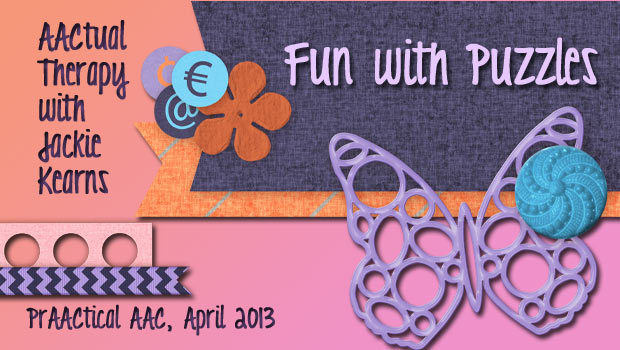
Today, we’re pleased to introduce SLP Jackie Kearns, coordinator of the Technology Resource Center at the Cleveland Clinic Children’s Hospital for Rehabilitation. Prior to that, she received her bachelor’s and master’s degrees from Ohio University. She completed both an undergraduate and graduate level thesis and has published in Contemporary Issues in Communication Sciences and Disorders. Jackie has over 5 years’ experience working with medically complex children in both inpatient and outpatient hospital settings. She has provided numerous AAC evaluations and treatment for children ranging from 1-21 years of age. In addition, she has done numerous presentations and in-services for staff at the Cleveland Clinic. We’re grateful to Jackie’s AAC professor and mentor, Dr. John McCarthy for recommending her to us. Therapy Activity: Fun with Puzzles Intended audience: Early intervention, preschool aged children, and/or emergent AAC communicators Type(s) of AAC: Eye gaze, reaching Picture communication symbols Single message voice output communication... [Read More...]









